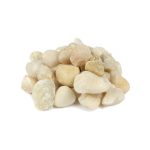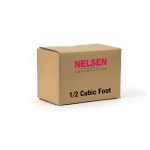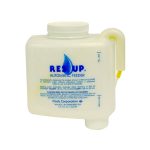Orders and Returns Policy
1. What is water softener resin? Water softener resin is a special type of polymer material used in water softeners to remove hardness minerals, such as calcium and magnesium, from the water supply.
2. How does water softener resin work? The water softener resin beads have a negative charge that attracts positively charged hardness minerals. As water passes through the resin bed, the hardness minerals are exchanged with sodium ions, effectively softening the water.
3. How long does water softener resin last? The lifespan of water softener resin depends on various factors such as water hardness, usage, and maintenance. On average, resin can last anywhere from 10 to 20 years before requiring replacement.
4. How often should I regenerate or recharge the resin in my water softener? Regeneration frequency depends on water hardness and usage. Most water softeners regenerate automatically based on a preset schedule or when a certain amount of water is used. It’s best to consult the manufacturer’s guidelines for your specific model.
5. Can I use any type of salt in my water softener? Most water softeners are designed to use salt specifically formulated for water softening, such as sodium chloride or potassium chloride. Using other types of salt, like rock salt or table salt, may damage the resin or reduce its effectiveness.
6. How much resin do I need for my water softener? The amount of resin required depends on the water softener’s size and capacity, which is usually measured in grains. The capacity required will depend on the water hardness and household water consumption. Consult the manufacturer’s guidelines or a water treatment professional for an accurate recommendation.
7. Can I clean or recharge water softener resin manually? Water softener resin regeneration is typically an automated process controlled by the softener’s control valve. Manual cleaning or recharging of resin is not recommended and may void the warranty or damage the system.
8. What happens if the water softener resin is damaged? If the resin bed is damaged or contaminated, it may lead to decreased water softening efficiency. In such cases, the resin may need to be replaced to restore optimal performance.
9. How can I tell if my water softener resin needs to be replaced? Signs of resin failure include decreased water softening capacity, increased hardness in the water, and a decline in overall system efficiency. If you notice these issues, it may be time to replace the resin.
10. Can I install a water softener resin bed myself? Installing a water softener resin bed can be complex and may require plumbing knowledge. It’s recommended to consult a professional plumber or follow the manufacturer’s installation instructions carefully.
11. Is water softener resin harmful to the environment? Water softener resin itself is not harmful to the environment. However, during the regeneration process, excess sodium or potassium chloride from the brine solution used can impact the environment if not disposed of properly. Follow local guidelines for salt brine disposal.
12. Can water softener resin remove other contaminants besides hardness minerals? Water softener resin primarily removes hardness minerals and does not effectively remove other contaminants like heavy metals, bacteria, or chemicals. For comprehensive water treatment, additional filtration systems may be necessary.
13. How often should I clean or maintain my water softener resin tank? Regular maintenance of the resin tank includes inspecting and cleaning the brine tank, ensuring proper salt levels, and checking for any leaks or signs of damage. Follow the manufacturer’s recommendations for maintenance frequency.
**14. Can water softener resin beads be harmful if ingested accidentally? Water softener resin beads are not intended for consumption and may pose a risk if ingested accidentally. If someone ingests resin beads, it is important to seek medical attention immediately. Contact a poison control center or consult a healthcare professional for guidance.
15. Can water softener resin cause water discoloration? In rare cases, water softener resin particles can become dislodged and cause water discoloration. This typically occurs when the resin bed is damaged or nearing the end of its lifespan. If you notice water discoloration, it is advisable to have the resin bed inspected and replaced if necessary.
16. Can water softener resin be used with well water? Yes, water softener resin can be used with well water. However, it is crucial to test the well water for any additional contaminants that may require specific treatment methods. Well water may often contain minerals and sediment that can be effectively removed by a water softener.
17. Can water softener resin remove chlorine from the water? Water softener resin is not designed to remove chlorine from the water. Its primary function is to remove hardness minerals. If you want to remove chlorine or other specific contaminants, you may need to consider additional water treatment methods, such as activated carbon filters or whole-house filtration systems.
18. Can I regenerate water softener resin more frequently to improve water quality? Regenerating water softener resin more frequently than necessary is not recommended. It can lead to excessive salt usage and wasteful water consumption. Follow the manufacturer’s guidelines for regeneration frequency to ensure optimal performance and efficiency.
19. Can high water temperatures affect water softener resin? Water softener resin is generally resistant to high water temperatures found in household plumbing systems. However, extremely high temperatures or prolonged exposure to very hot water can potentially damage the resin. It is best to check the manufacturer’s specifications for the recommended temperature limits.
20. Can I reuse water softener resin after regeneration? Regenerated water softener resin can be reused in most cases. However, over time, the resin’s effectiveness may decline, and it may need to be replaced eventually. It’s essential to monitor the water softener’s performance and consult the manufacturer’s recommendations for resin replacement.
Remember, if you have specific concerns or questions about water softener resin, it is always recommended to consult the manufacturer’s instructions or seek advice from a water treatment professional to ensure proper installation, usage, and maintenance of your water softener system.




